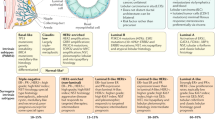Abstract
Multidrug resistance in MCF-7/Adr human breast cancer cells is mediated by several mechanisms including overexpression of the MDR1 gene product, P-glycoprotein and glutathione-related detoxifying enzymes. Mutations in the p53 tumor suppressor protein have been reported to play a role in the development of resistance to DNA damaging agents in several human cancer cells. In the present study we have assessed the mutational status of the p53 protein and its expression levels, degree of stability and cellular localization to investigate whether it is involved in modulating multidrug resistance in MCF-7/Adr cells compared to sensitive MCF-7 cells. As revealed by immunofluorescence microscopy using the anti-p53 mouse monoclonal antibody DO-1, wild-type p53 is sequestered in the cytoplasm of MCF-7 cells, whereas in MCF-7/Adr cells, the protein is localized in the nucleus. The sequencing of full-length p53 cDNA revealed a 21 bp deletion in its one of the four conserved regions within the conformational domain, spanning codons 126-133 at exon five, in MCF-7/Adr cells. Moreover, detection of ThaI polymorphism of codon 72 showed that MCF-7 cells predominantly express wild-type p53 with proline, while mutated p53 in MCF-7/Adr cells contains an arginine residue at codon 72. In addition, we demonstrate that the half-life of p53 in MCF-7 cells is less than 30 min while the mutated protein is more stable; its half-life is about 4 h in MCF-7/Adr cells. Thus, this study demonstrates that the deletion of codons 126-133 in p53 causes increased stability, overexpression and nuclear localization of the protein in multidrug resistant MCF-7/Adr cells, and further suggests that mutated p53 might be involved in the development of multidrug resistance in this cell line.
This is a preview of subscription content, access via your institution
Access options
Subscribe to this journal
Receive 50 print issues and online access
$259.00 per year
only $5.18 per issue
Buy this article
- Purchase on Springer Link
- Instant access to full article PDF
Prices may be subject to local taxes which are calculated during checkout
Similar content being viewed by others
Author information
Authors and Affiliations
Rights and permissions
About this article
Cite this article
Ogretmen, B., Safa, A. Expression of the mutated p53 tumor suppressor protein and its molecular and biochemical characterization in multidrug resistant MCF-7/Adr human breast cancer cells. Oncogene 14, 499–506 (1997). https://doi.org/10.1038/sj.onc.1200855
Received:
Revised:
Accepted:
Issue Date:
DOI: https://doi.org/10.1038/sj.onc.1200855
Keywords
This article is cited by
-
Chemosensitivity to doxorubicin in primary cells derived from tumor of FVB/N-Trp53tm1Hw1 with TALEN-mediated Trp53 mutant gene
Laboratory Animal Research (2023)
-
The atypical cyclin-like protein Spy1 overrides p53-mediated tumour suppression and promotes susceptibility to breast tumourigenesis
Breast Cancer Research (2019)
-
Ribophorin II regulates breast tumor initiation and metastasis through the functional suppression of GSK3β
Scientific Reports (2013)
-
Effects of geranyl-phloroacetophenone on the induction of apoptosis and chemosensitization of adriamycin-resistant MCF-7 human breast cancer cells
Archives of Pharmacal Research (2012)
-
A cytotoxic ribonuclease reduces the expression level of P-glycoprotein in multidrug-resistant cell lines
Investigational New Drugs (2012)



